Higher and additional education in IT: the results of the research "My circle"

In Euchar, the opinion was long established that a successful career in IT is impossible without permanent education. Some generally recommend choosing an employer who has strong training programs for their employees. In recent years, a huge number of additional professional education schools have also appeared in the IT field. In the trend of individual development plans and coaching employees.
Observing such tendencies, we, on My Circle, added the ability to indicate in our profile courses completed. And they did a survey: they organized a survey and collected 3,700 users of My Circle and Habra about their educational experience:
')
- In the first part of the study, we understand how higher education and additional education affect employment and career, on the basis of which considerations IT specialists receive additional education and in what areas, what do they get from it in practice, by what criteria they choose courses.
- In the second part of the study , which will be released a bit later, we will deal with the educational institutions existing on the market of additional education, find out which ones are the most famous and which are the most popular, and finally build their rating.
1. The role of basic and additional education in employment and career
85% of specialists working in IT have a higher education: 70% have already completed, 15% are still finishing. At the same time, only 60% have an education that is specialized for IT. Among specialists with non-core higher education, “techies” are two times more than “humanities”.
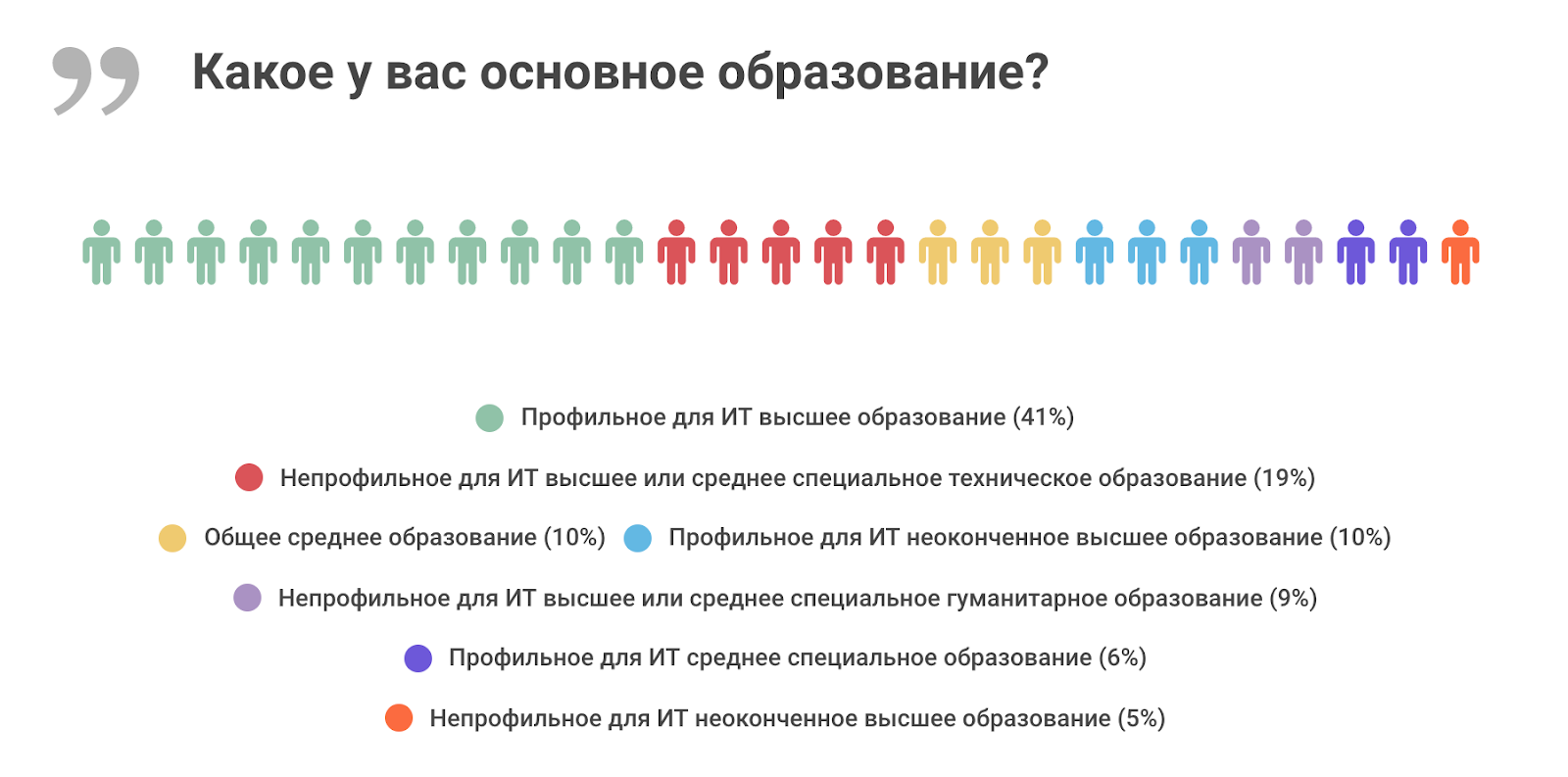
Despite the fact that two thirds of the respondents had their basic education connected with programming, only one out of every five had internships with future employers.
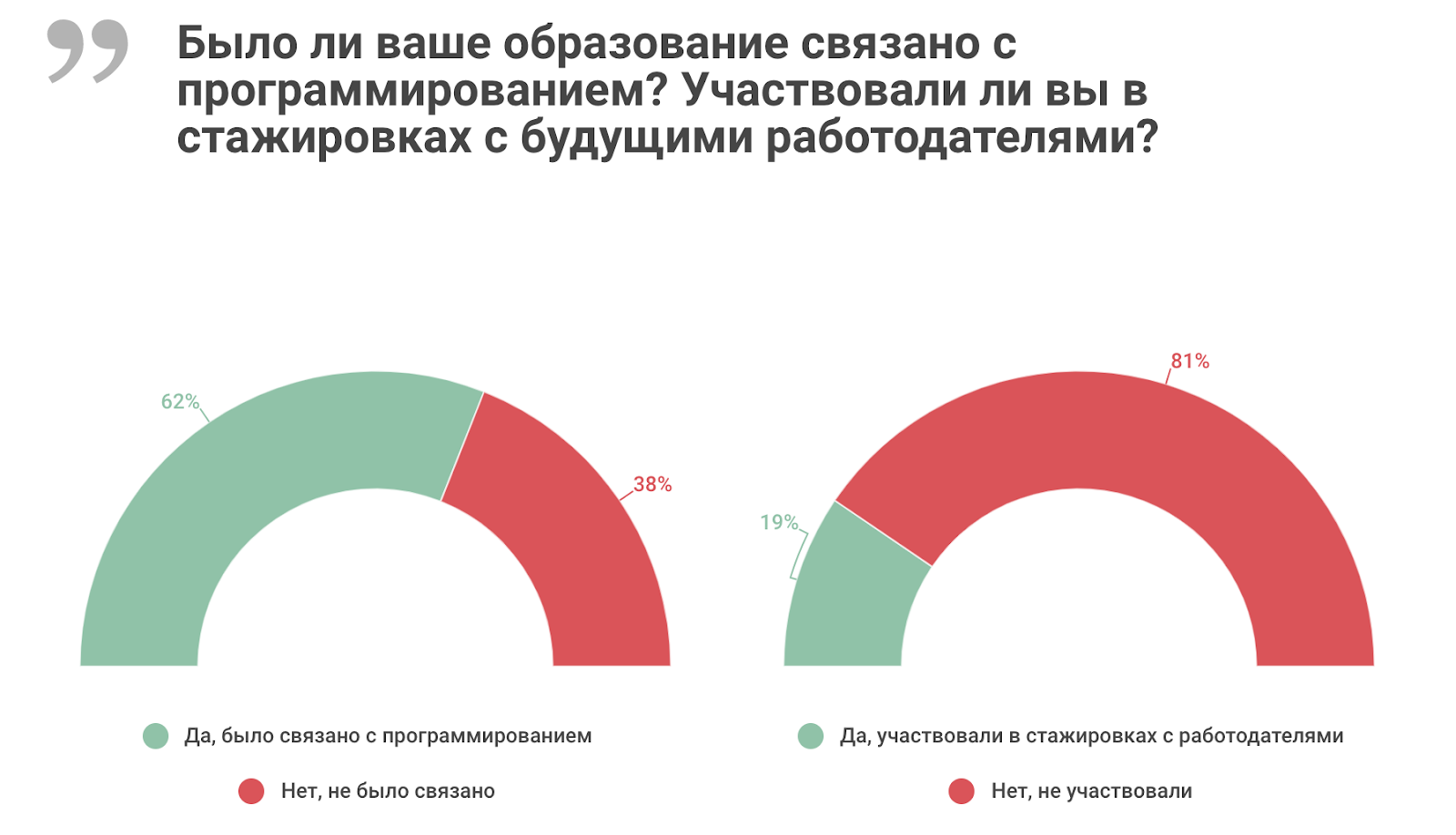
And no more than a third note that the theoretical training and practical programming skills gained during this education turned out to be useful to them.

As you can see, today a higher education does not adequately respond to the needs of the labor market in IT: for the majority it does not provide sufficient theory and practice to feel comfortable in their professional activities.
In particular, therefore, today almost every IT specialist in the course of his professional activity is engaged in self-education: through books, videos, blogs; two out of three are taking additional vocational education courses, and the majority pay for them; every second attends seminars, meetings, conferences.
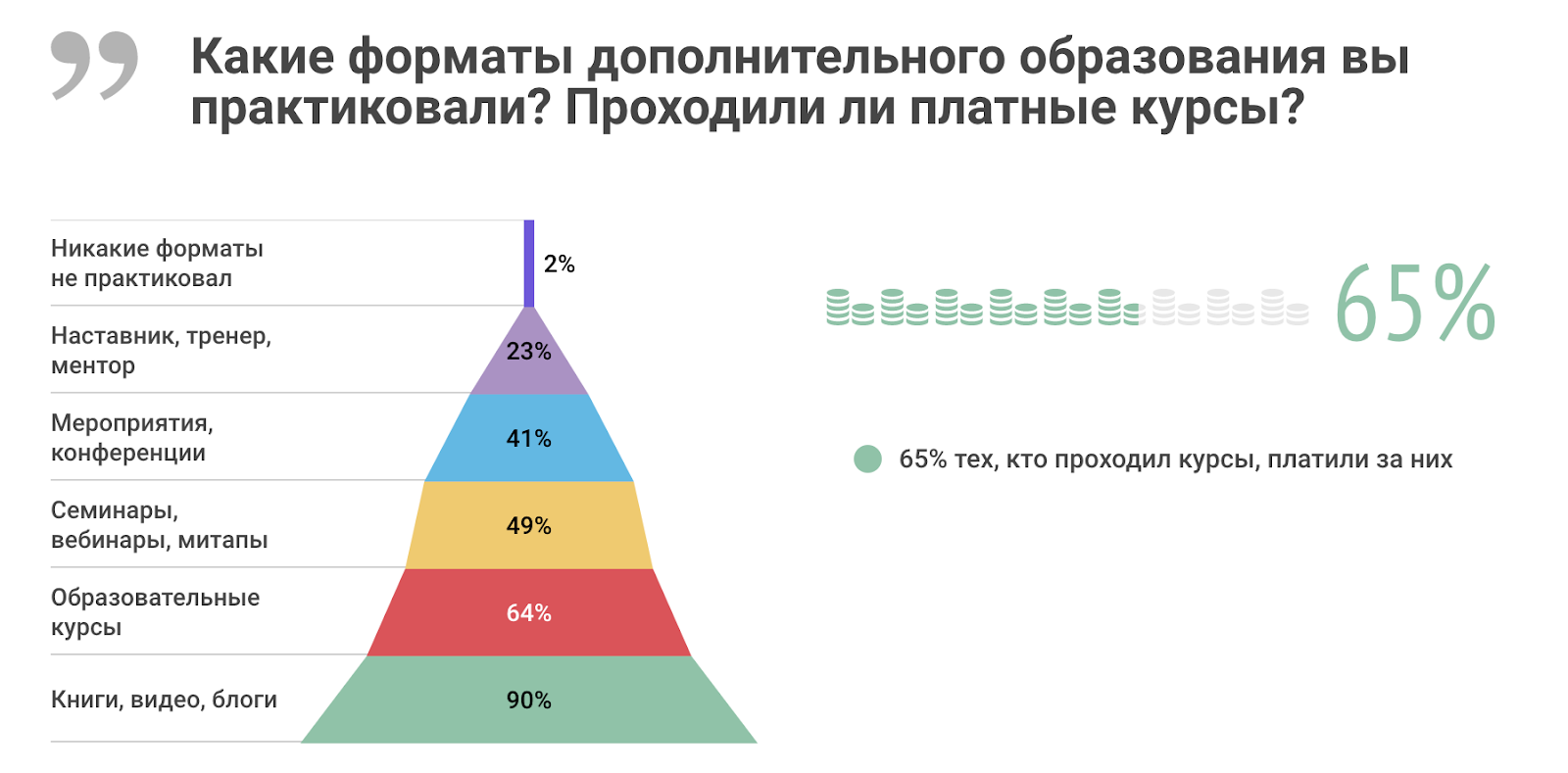
In spite of everything, in higher education, specialized in IT, in 50% of cases, it helps applicants to find a job and in 25% of cases in career advancement, non-specialized higher education in IT - in 35% and 20% of cases, respectively.
Asking a question about whether the additional education helps in employment and career, we formulated it like this: “Did the presence of a certificate help you in your career growth in the company?”. And we got that in 20% it helps in employment and in 15% in a career.
However, in another place of the survey, we asked the question in a different way: “Did the completed additional education courses help you get a job?”. And they received completely different figures: 43% answered that the school in one form or another helped with employment (in the form of experience necessary for work, replenishment of a portfolio or direct acquaintance with an employer).
As you can see, higher education still plays the largest role in mastering the IT professions. But additional education is already a powerful competition for him, even overtaking higher education, non-core for IT.
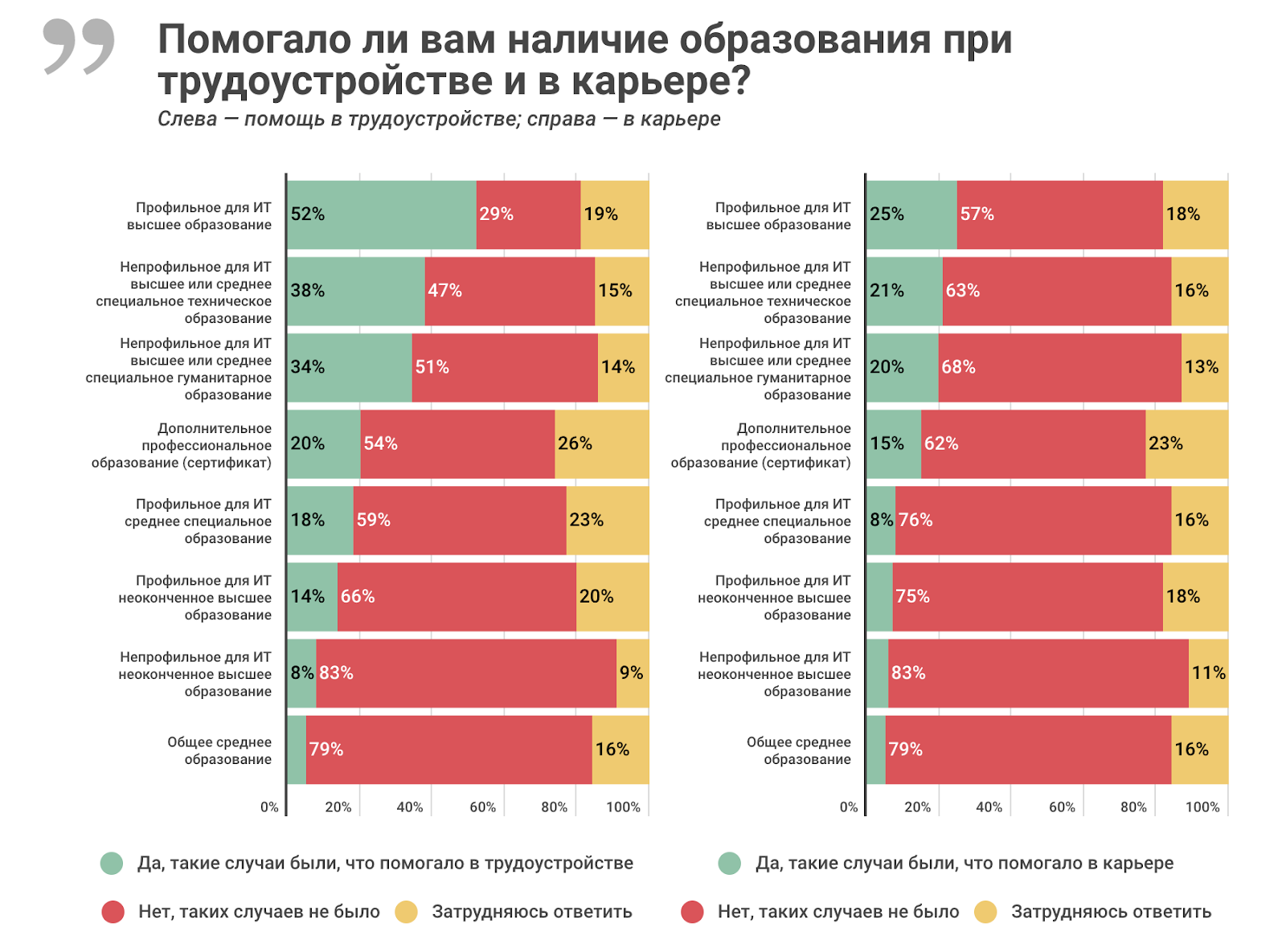
Now let's see how the employer looks at the higher and additional education.
It turns out that every second IT specialist participates in evaluating new employees when they are hired. 50% of them are interested in higher education and 45% in additional education. In 10-15% of cases, information about the education of a candidate significantly influences the decision about hiring him.


60% of specialists in their companies have an HR department or a separate HR specialist: in large private companies there is almost always, in small private or public companies - in half of the cases.
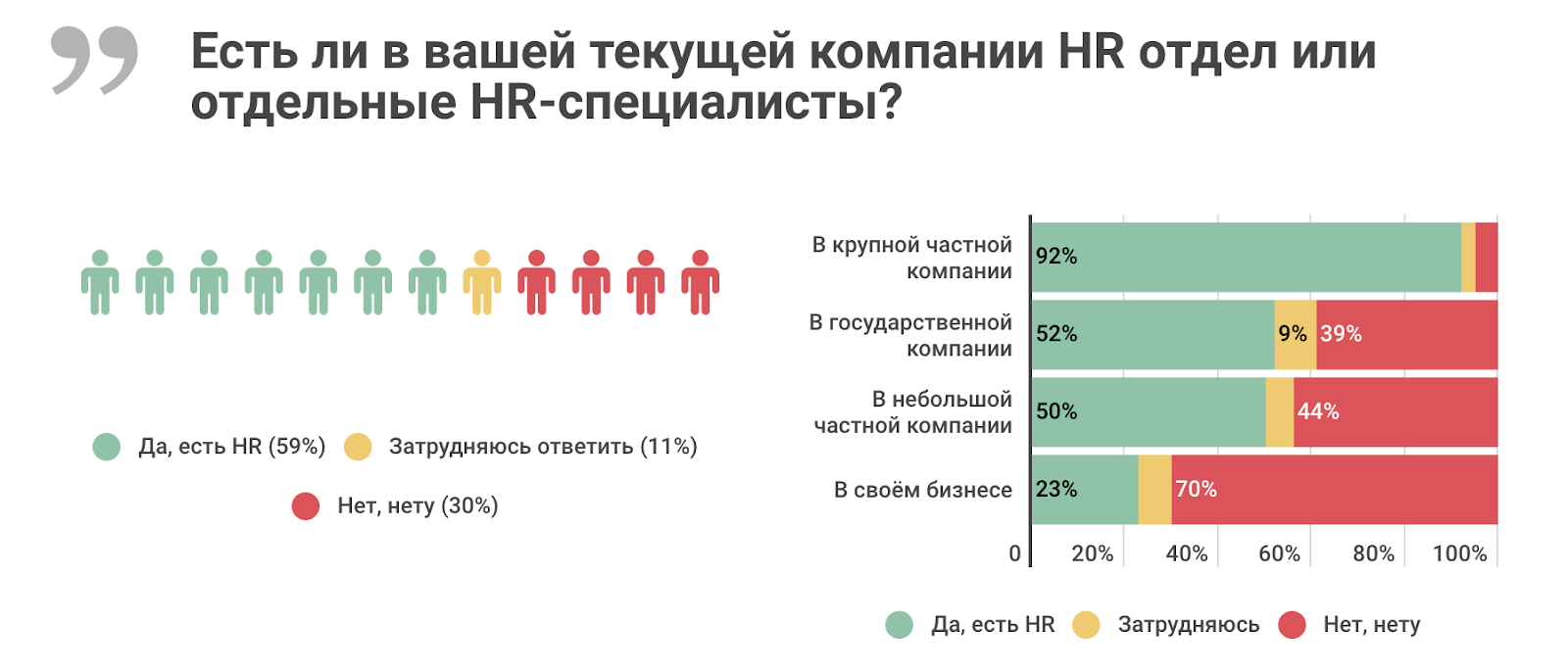
Companies that have HR are more sensitive to the education of their staff. Such companies in 45% of cases themselves take the initiative to educate their employees and only in 14% of cases do not help with education at all. Companies that don’t have a dedicated HR function - only 17% take the initiative and don’t help in 30% of cases.
Being engaged in the education of super-workers, employers pay almost equal attention to such formats as events, educational courses and meetings.
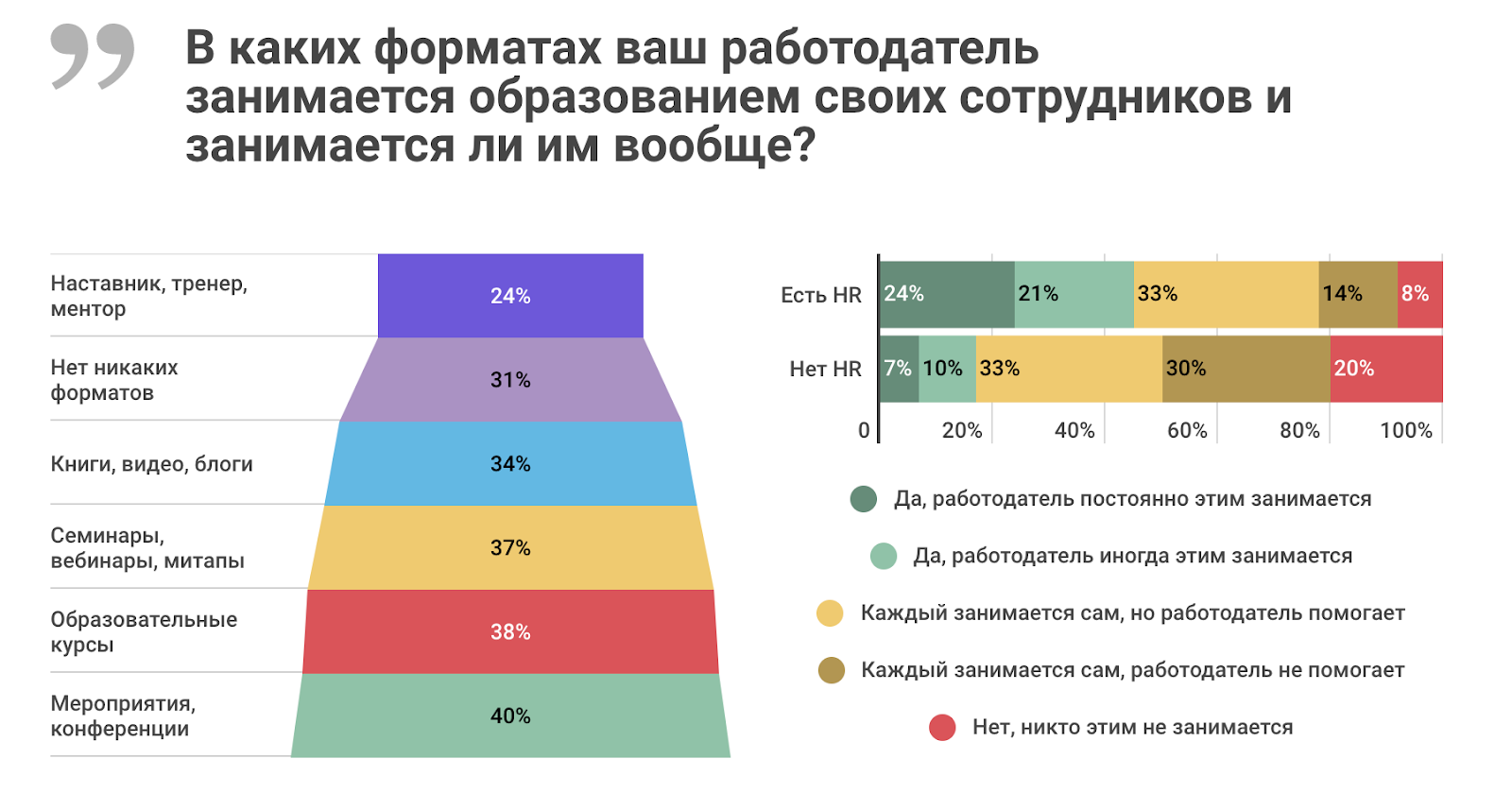
2. Why get additional education.
If you look at the whole, then most often they get additional education for: general development - 63%, solving current tasks - 47% and receiving a new profession - 40%. But if you look at the details, you will see some differences in goal setting, depending on the basic education you have.
Among specialists with a basic education for IT, about 70% receive additional education for general development, 30% for a new profession, 15% for a change in the field of activity.
And among specialists with a non-core IT education, 50% are for general development, 50% are for getting a new profession, 30% are for changing the field of activity.
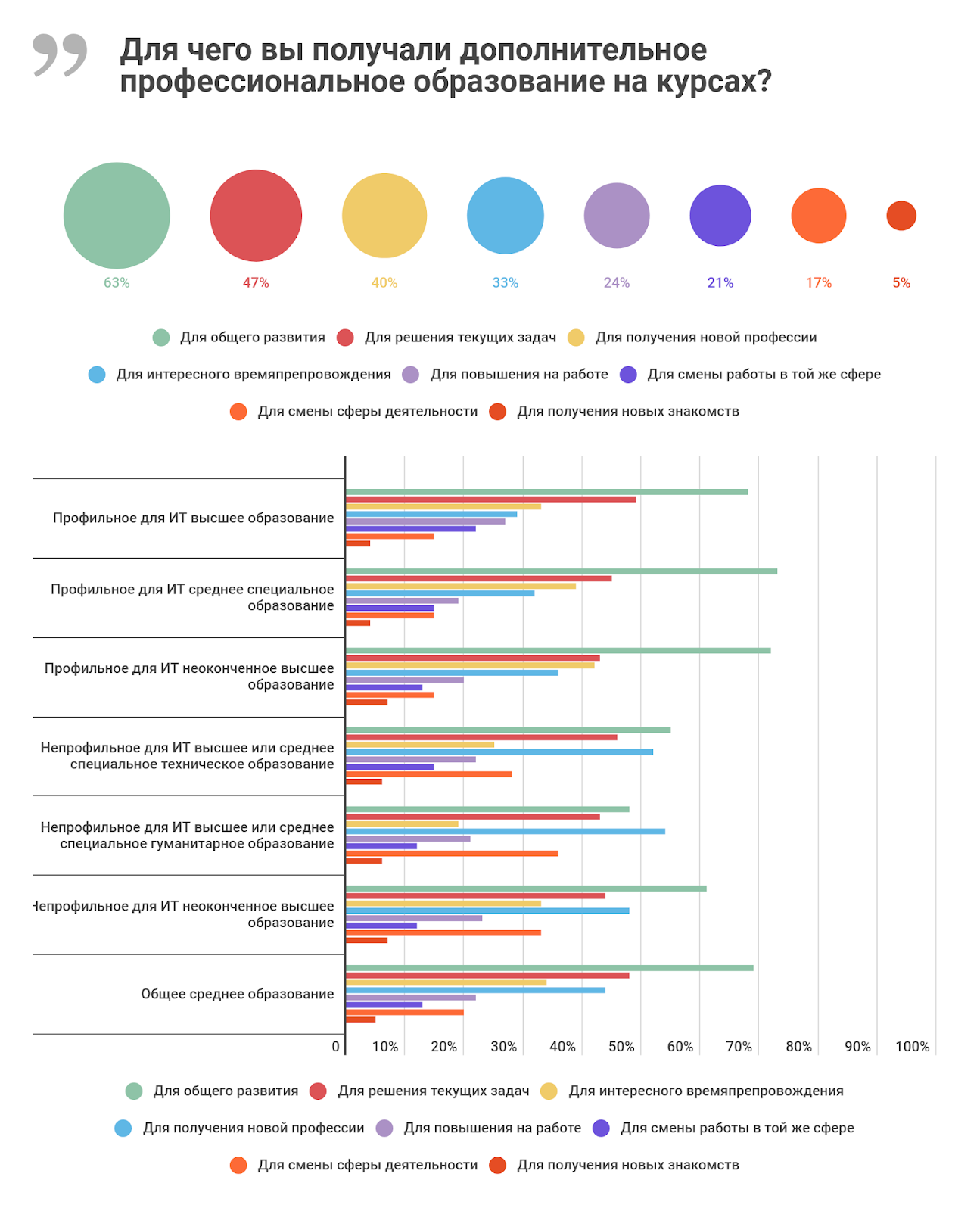
There are also differences in the meaning of obtaining additional education, depending on the current field of activity of a specialist.
With the help of additional education, current tasks are solved more often than others (50-66%) in management and marketing, as well as in HR, administration, testing and support.
They get a new profession more often than others (50-67%) in content, frontend and mobile development.
For the sake of general interest, more often than others (46-48%) take courses in mobile and game development.
To get a promotion at work more often than others (30-36%) take courses in sales, management and Euchare.
Most of the specialists in the frontend, game development and marketing (29-31%) study to change their field of activity.
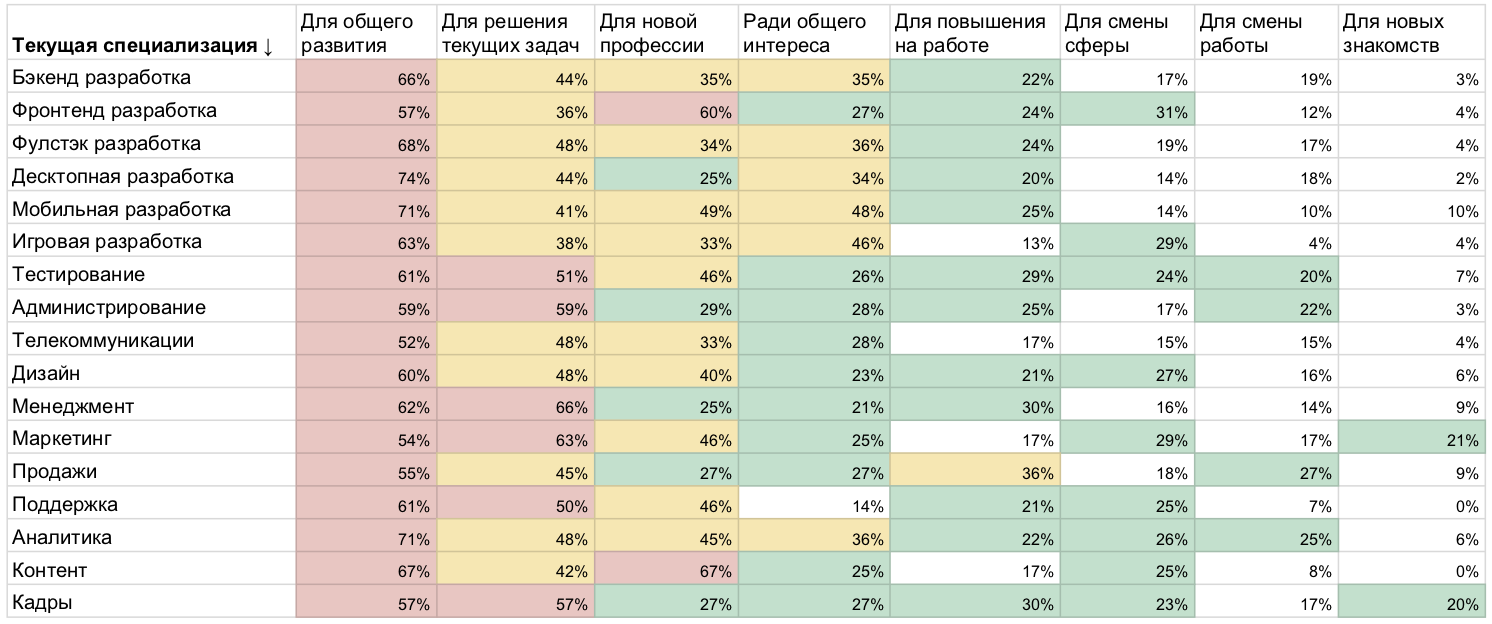
3. In which areas receive additional education.
It is logical that most specialists practice additional education according to their current specialization. However, in practice, many practice additional education not only in the area where they are currently working.
So, if we compare the number of specialists in each field with the number of practitioners in this field, we will see that there are many more second students than the first.
For example, if backend developers are 24% of our respondents, then 53% of respondents were engaged in education in the backend. On one working in the specialty backend there are 1.2 of those who studied the backend, but are currently working on another specialty.
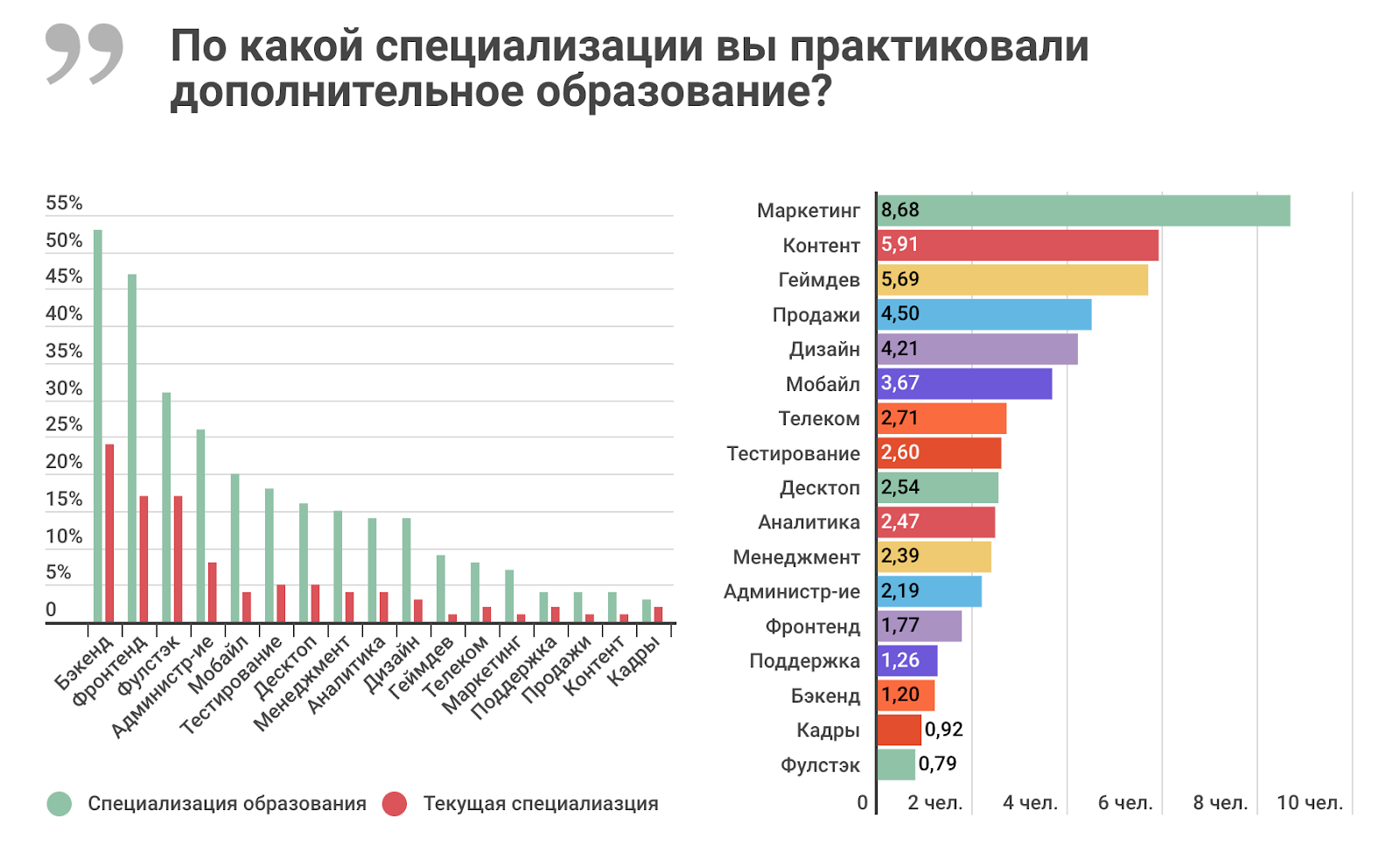
It is interesting to see how each of the educational areas is widely and deeply in demand by specialists from other fields.
The most popular ones in this sense are backend and front-end development: 20% or more of the specialists from 9 other spheres indicated that they studied in these specializations (highlighted in green, yellow and red). Administration is in the second place - the same significant share of specialists from 6 other spheres was noted here. The third is management - specialists from 5 other areas were noted here.
Specializations, the least popular in other areas of activity, are HR and support. There are no such areas at all in which 20% or more of the specialists would note that they studied in these areas.
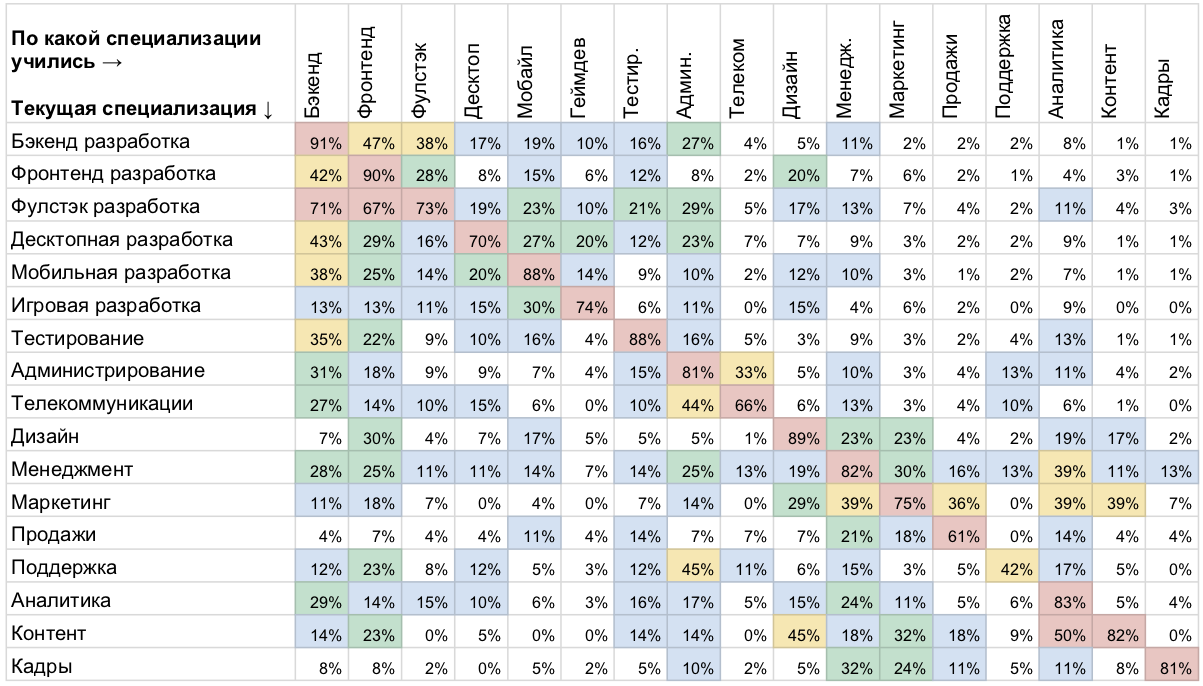
4. What qualification does additional education give?
In general, in 60% of cases, educational courses do not provide any new qualifications. This is not surprising if we recall that the main reasons for obtaining additional education are general development and the solution of current problems.
After additional education, the most likely are June (18%), interns (10%) and Middle (7%). However, if we look in more detail, we will see quite large differences in the acquisition of new qualifications, depending on the fields of activity of IT specialists.
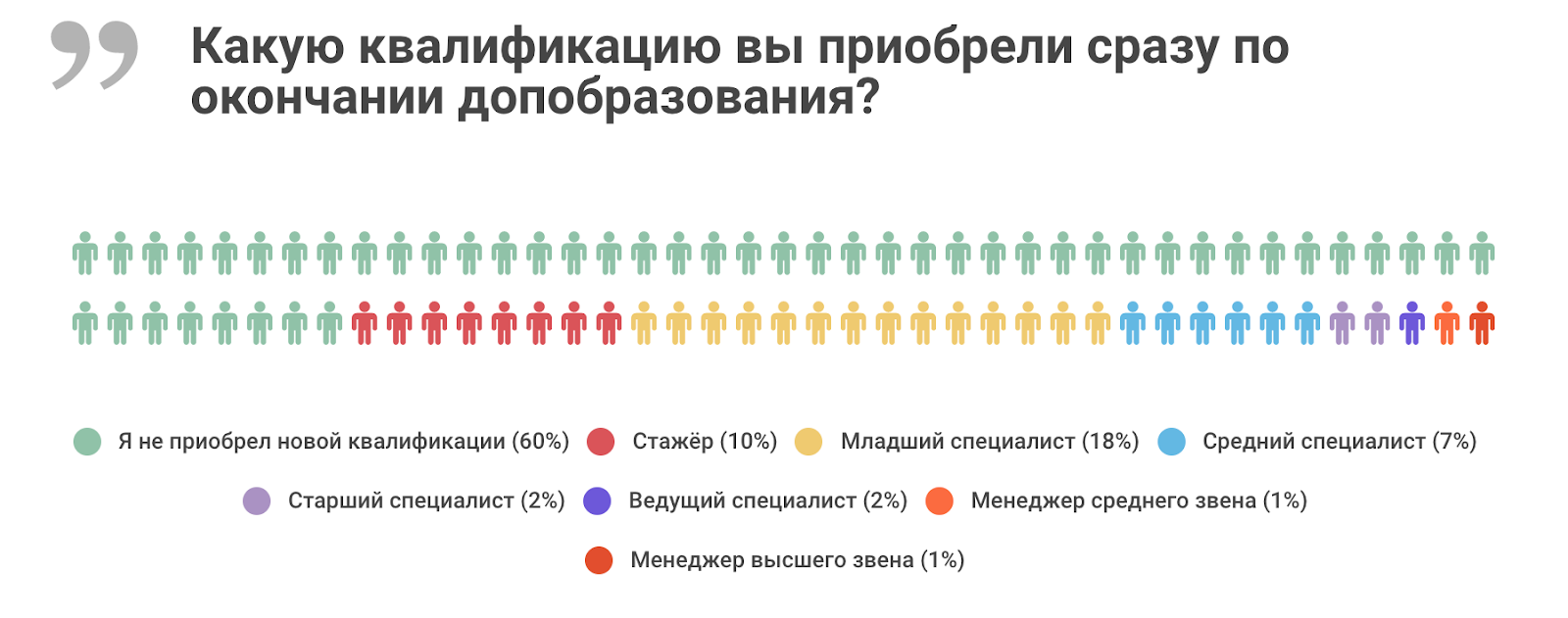
After the courses, the most june appear in frontend and mobile development (33%), as well as in testing, marketing and game development (20-25%).
Most interns are in sales (27%) and front end (17%).
Most of the middle ones are in mobile development (11%) and administration (11%).
Most of the leads are in design (10%) and eychare (10%).
The most senior managers are marketing (13%) and management (6%).
It is curious that seniors - in more or less noticeable quantities - educational courses are not prepared for any specialties.
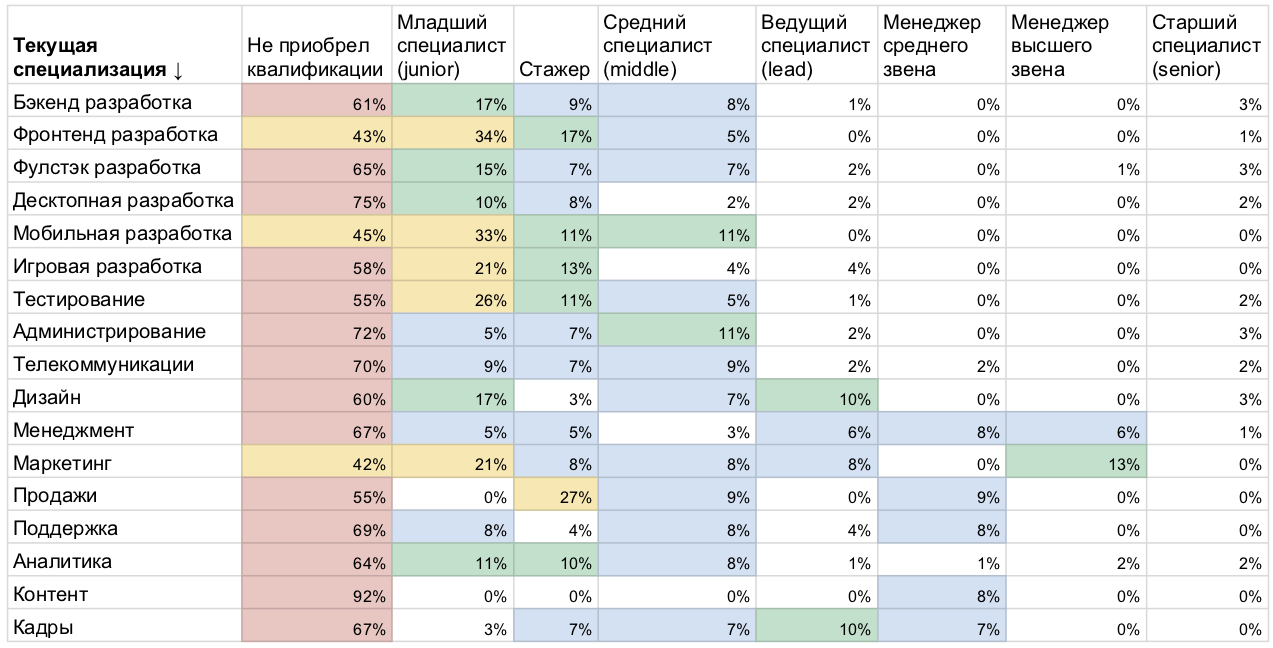
5. A bit about secondary education schools
More than half took courses in more than one school of additional education. The most important criteria for choosing courses are the training program (74% noted this criterion) and the format of training (54%).
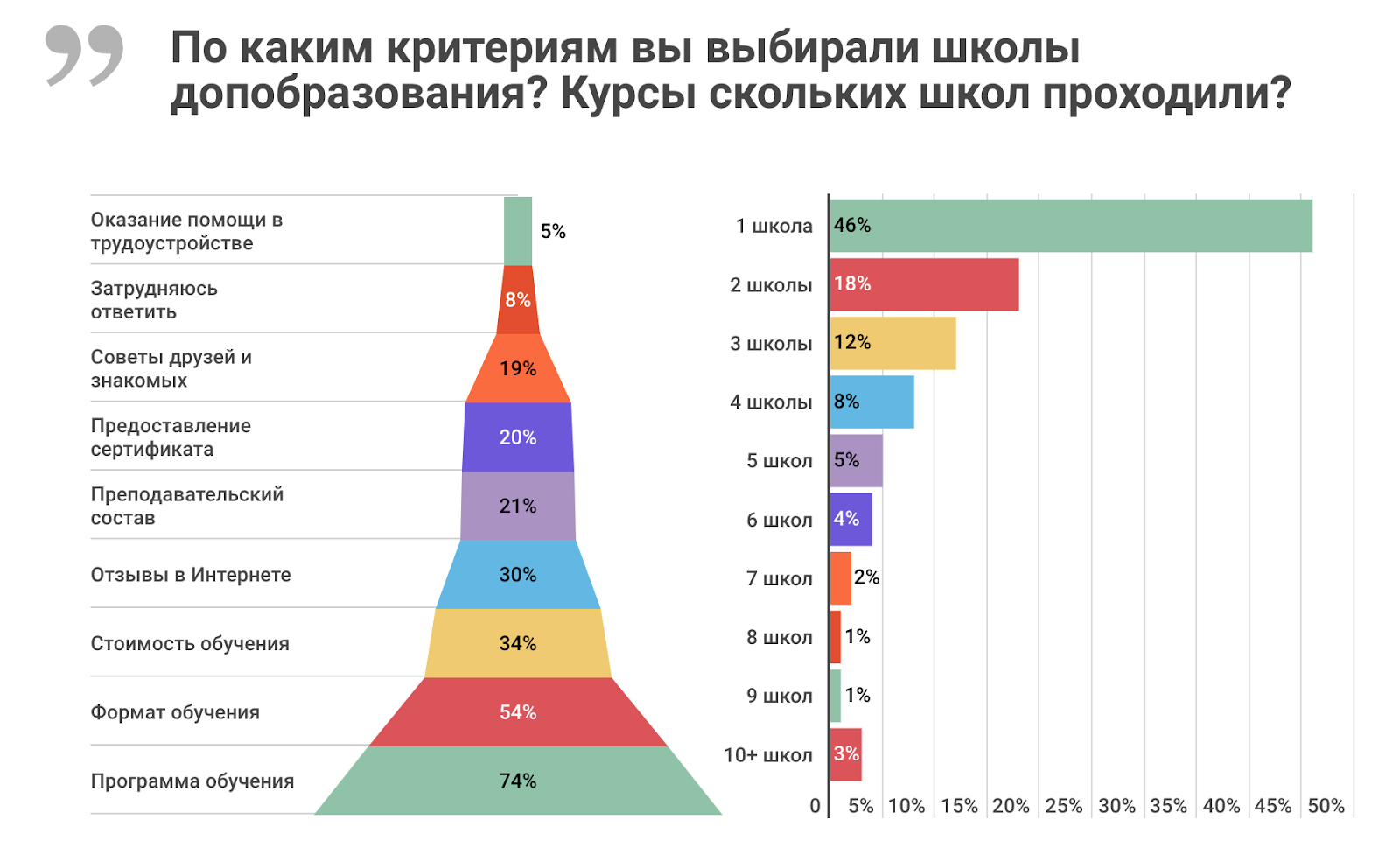
As we saw above, 65% of those who took additional education courses paid for them at least once. Two thirds of those who took the paid courses and one third of those who took the free courses received a certificate of the course. The majority considers that the main thing for such a certificate is that it is recognized by the employer.
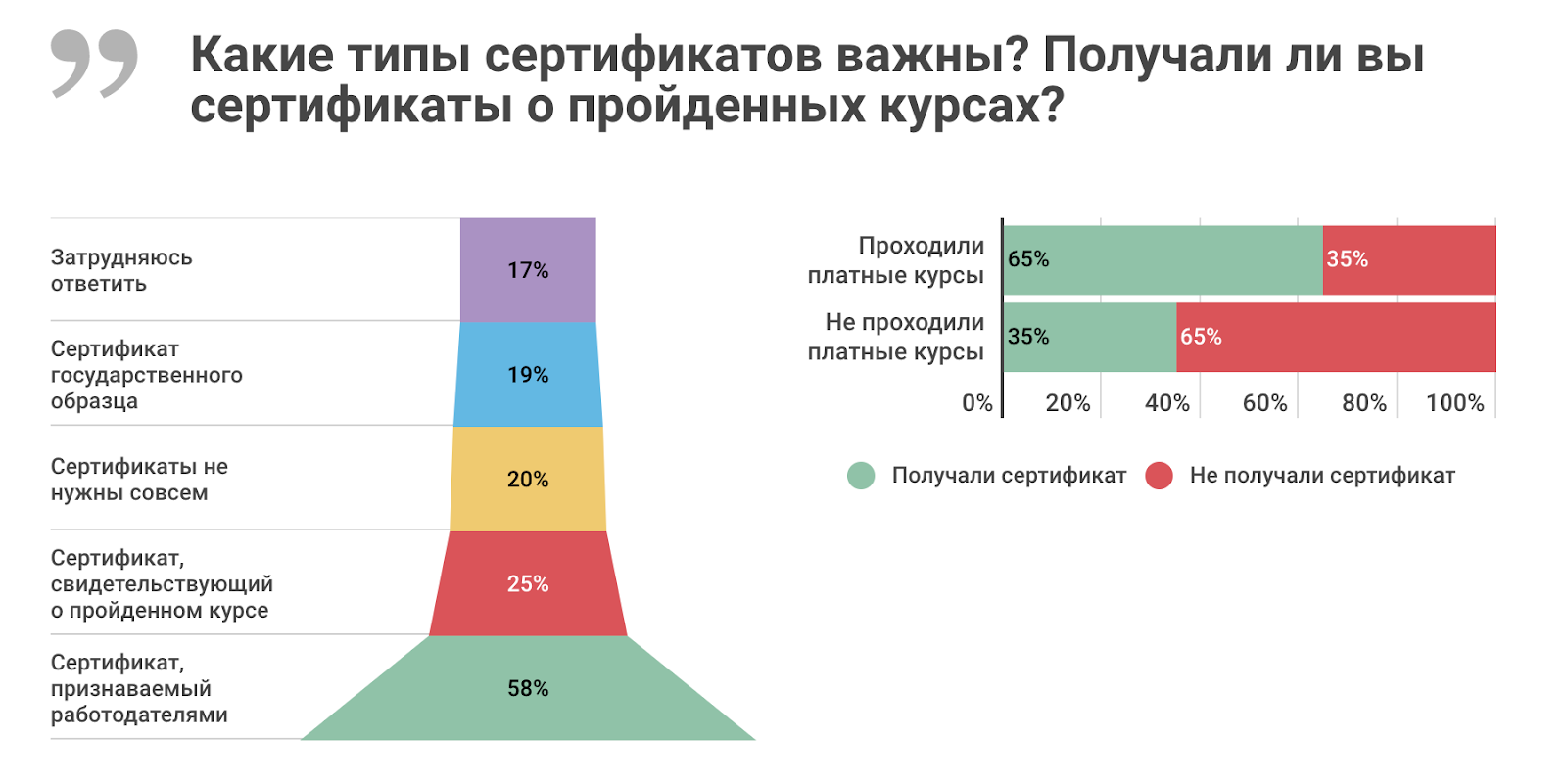
Although the majority note that the school of additional education did not help them with finding employment, 23% of those who took free courses and 32% of those who took paid courses said that the school provides the experience necessary for work. The school also provides an opportunity to replenish the portfolio with projects or even directly employ its graduates.
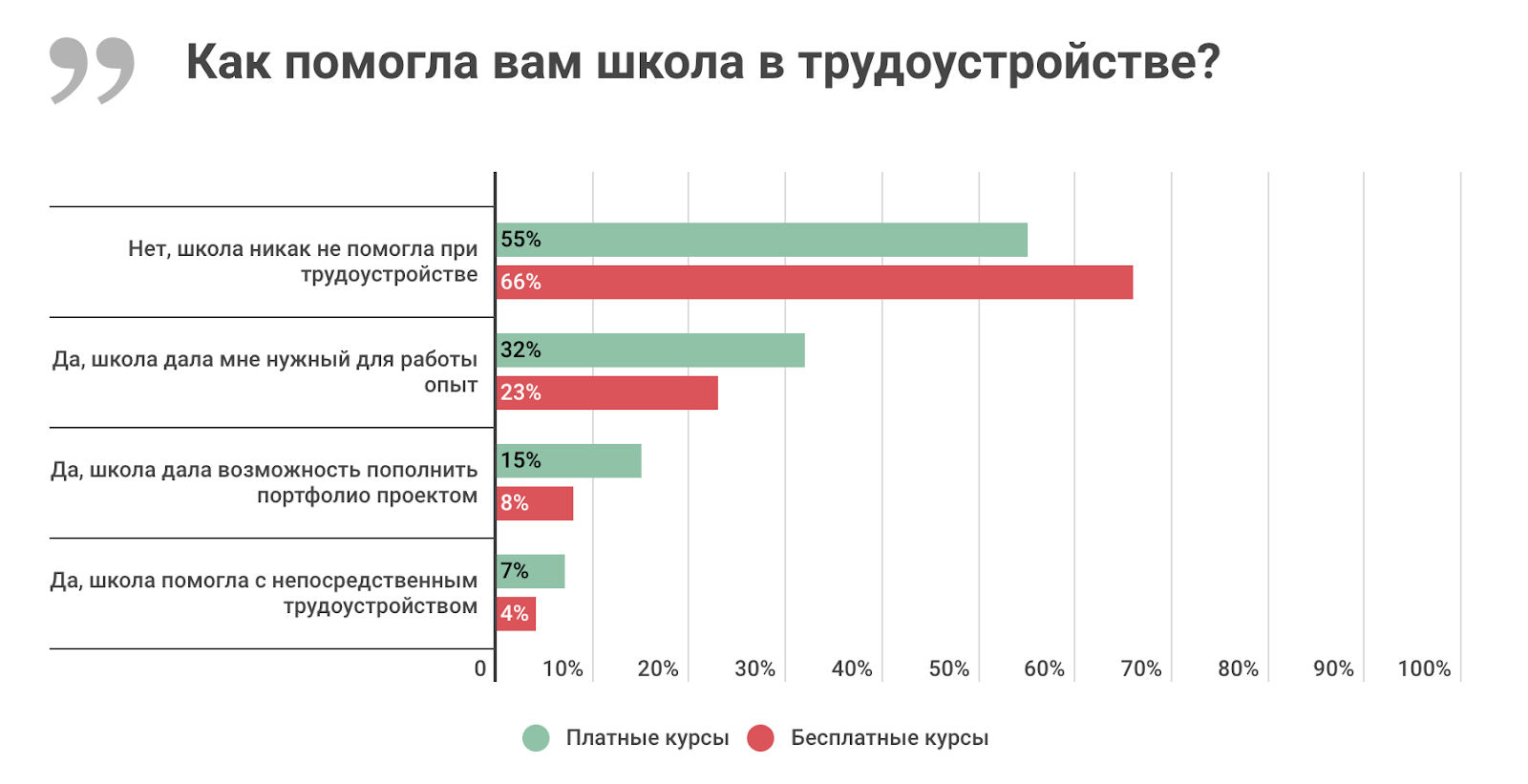
In the second part of our study, we will carefully consider all existing schools in additional education in IT, see which ones help graduates better than others in employment and career, and build their ranking.
PS Who participated in the survey
About 3700 people took part in the survey:
- 87% of men, 13% of women, the average age is 27 years, half of respondents aged from 23 to 30 years.
- 26% from Moscow, 13% from St. Petersburg, 20% from million-plus cities, 29% from other cities of Russia.
- 67% are developers, 8% are system administrators, 5% are testers, 4% are managers, 4% are analysts, 3% are designers.
- 35% of secondary specialists (middle), 17% of junior specialists (junior), 17% of senior specialists (senior), 12% of leading specialists (lead), 7% of students, 4% of trainees, middle and senior managers.
- 42% work in a small private company, 34% in a large private company, 6% in a state-owned company, 6% freelancers, 2% have their own business, 10% do not work temporarily.
Source: https://habr.com/ru/post/454010/
All Articles